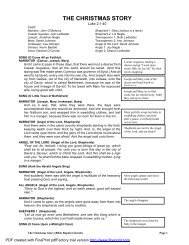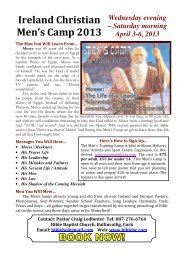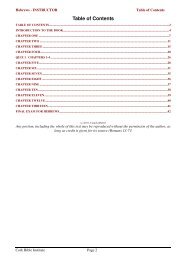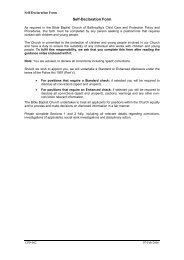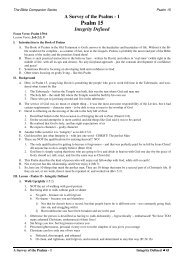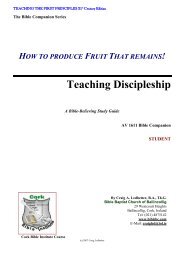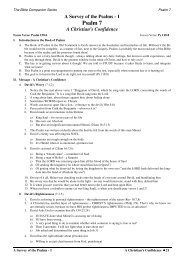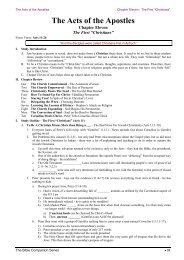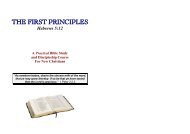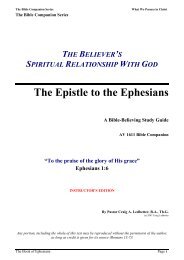<strong>Argumentation</strong> <strong>and</strong> <strong>Debate</strong>Page 10The Priority of <strong>Debate</strong>we must become well informed if we are <strong>to</strong> speak the truth. It starts with becoming wellinformed in God’s word. It is the fountain of life <strong>and</strong> the foundation of all true knowledge.G. His<strong>to</strong>ry did not cease in the Apos<strong>to</strong>lic era. So we must study his<strong>to</strong>ry from the ancient past <strong>to</strong>the present, evaluating his<strong>to</strong>ry according <strong>to</strong> scriptural principles. <strong>An</strong>d we must study God’screation, building upon the information revealed in scripture with additional insights in<strong>to</strong>how God has ordered the world.H. <strong>An</strong>d we must study __________ <strong>to</strong> insure we are thinking coherently <strong>and</strong> consistently.Indeed, there are many areas we must study <strong>to</strong> rid ourselves of ignorance. But simplybecause we are speaking truth based upon true knowledge does not mean we are necessarilyspeaking as well as we should. Speaking itself requires skill. It takes skill <strong>to</strong> present whatwe know in an organized fashion that others can underst<strong>and</strong>. Christian men should beprepared in communication <strong>and</strong> speech. For we are encouraged <strong>to</strong> “be ready always <strong>to</strong> givean answer <strong>to</strong> every man that asketh you a reason of the hope that is in you with meekness<strong>and</strong> fear…” (1 Peter 3:15) <strong>An</strong>d the ability <strong>to</strong> speak, especially publicly, requires practice.I. One excellent way, especially for young men, <strong>to</strong> obtain practice in public speaking isthrough formal public debate. This course introduces you <strong>to</strong> public debate as one means <strong>to</strong>equip you in public speaking. Hopefully, as you acquire skills in public debate, you will beable <strong>to</strong> employ the skills <strong>to</strong> public speaking in general.J. Now the view of human speech outlined in scripture is markedly different from theprevalent humanist notion of speech.1. Whereas the <strong>Bible</strong> declares the requirement that our speech be ________________, thehumanist notion declares it should be ________.2. In chapter 1 of <strong>An</strong> <strong>Introduction</strong> <strong>to</strong> <strong>Argumentation</strong> <strong>and</strong> <strong>Debate</strong>, John Mil<strong>to</strong>n is quoted assaying, “Give me the liberty <strong>to</strong> know, <strong>to</strong> utter, <strong>and</strong> <strong>to</strong> argue freely according <strong>to</strong>conscience, above all liberties.” It is little wonder that Mil<strong>to</strong>n placed such a highemphasis on freedom (so called) rather than truth in accordance with God’s word, forJohn Mil<strong>to</strong>n (1608–1674) was a Unitarian. (See his work De Doctrina Christiana.) <strong>An</strong>dit should not surprise us that the Founding Fathers of America followed suit with thesame notion in the constitutional framework of the United States. In America during the18th century, French <strong>and</strong> English Deism <strong>and</strong> rationalism made Unitarians of many ofour founding fathers. Benjamin Franklin, Thomas Jefferson, John Adams, ThomasPaine, James Madison <strong>and</strong> James Marshall were all Unitarians. They overthrew thereformed <strong>and</strong> Puritan order which dominated most of the colonial American era.K. God never gave men a right <strong>to</strong> speak falsehood (such as the advocacy of Unitarianism)under the pretence of “freedom of speech”.1. Jesus Christ Himself rebuked the Jews for circumventing the comm<strong>and</strong> <strong>to</strong> put children<strong>to</strong> death who cursed their parents. Jesus certainly did not believe children had the“right” <strong>to</strong> speak their mind <strong>to</strong> parents, when that mind was evil.2. Obviously freedom of speech has limits – especially where lies are involved.L. In truth, once humanists gained the upper h<strong>and</strong> in government, they were not so generous asthey claimed in their vaunted principle of “freedom of speech”.1. Let a Christian teacher try <strong>to</strong> teach the truth about Darwinian evolution in public school,<strong>and</strong> see what happens.2. <strong>An</strong>d let a Christian valedic<strong>to</strong>rian state in his valedic<strong>to</strong>ry speech that Jesus Christ is theonly way <strong>to</strong> heaven, <strong>and</strong> see what happens.3. The reality is that in any society “politically correct” speech will dominate; the realquestion is whether God’s word defines what is politically correct.M. The primary point, it is important that our public speech conforms <strong>to</strong> the st<strong>and</strong>ard of truth,including in debate.
<strong>Argumentation</strong> <strong>and</strong> <strong>Debate</strong>His<strong>to</strong>ry of <strong>Debate</strong> – Rhe<strong>to</strong>ricI. Began with <strong>An</strong>cient ____________ (Acts 17:18)His<strong>to</strong>ry of <strong>Debate</strong> – Rhe<strong>to</strong>ricA. Academic debate began at least 2,400 years ago when the scholar Protagoras of Abdera(481- 411 B.C.), known as the father of debate, conducted debates among his students inAthens.B. <strong>Debate</strong>s started out as attempts at trying <strong>to</strong> find out all truth. Obviously, all truth cannot befound out by the use of reason aloneC. <strong>Debate</strong>s ended up being forms of entertainment, <strong>and</strong> also justification for how things were –all so that people did not have <strong>to</strong> take responsibility for their actions <strong>and</strong> attitudes (see adrunkard how they will avidly debate their sin)D. ______________________1. These were so called from Epicurus, the son of Neocles, who was born 342 years beforeChrist, <strong>and</strong> taught philosophy at Athens, in his garden2. The principal tenets of which were:a. The world was not made by any deity, or with any design, but came in<strong>to</strong> its being<strong>and</strong> form, through a fortui<strong>to</strong>us concourse of a<strong>to</strong>ms, of various sizes <strong>and</strong> magnitude,which met, <strong>and</strong> jumbled, <strong>and</strong> cemented <strong>to</strong>gether, <strong>and</strong> so formed the worldb. That the world is not governed by the providence of God; for though he did not denythe being of God, yet he thought it below his notice, <strong>and</strong> beneath his majesty <strong>to</strong>concern himself with its affairs;c. That the chief happiness of men lies in pleasure.3. His followers were called "Epicureans"; of which there have been two sorts;a. The one were called the strict or rigid "Epicureans", who placed all happiness in thepleasure of the mind, arising from the practice of moral virtue, <strong>and</strong> which is thoughtby some <strong>to</strong> be the true principle of "Epicureans"b. The other were called the loose, or the remiss Epicureans, who unders<strong>to</strong>od theirmaster in the gross sense, <strong>and</strong> placed all their happiness in the pleasure of the body,in brutal <strong>and</strong> sensual pleasure, in living a voluptuous life, in eating <strong>and</strong> drinking, etc.<strong>and</strong> this is the common notion imbibed of an Epicurean.E. ______________1. The author of this sect was Zeno, whose followers were so called from the Greek word"S<strong>to</strong>a", which signifies a portico, or piazza, under which Zeno used <strong>to</strong> walk, <strong>and</strong> teachhis philosophy, <strong>and</strong> where great numbers of disciples attended him, who from hencewere called "S<strong>to</strong>ics"2. Their chief tenets were:a. There is but one godb. that the world was made by him, <strong>and</strong> is governed by fatec. that happiness lies in virtue, <strong>and</strong> virtue has its own reward in itselfd. that all virtues are linked <strong>to</strong>gether, <strong>and</strong> all vices are equale. that a wise <strong>and</strong> good man is destitute of all passion, <strong>and</strong> uneasiness of mind, isalways the same, <strong>and</strong> always joyful, <strong>and</strong> ever happy in the greatest <strong>to</strong>rture, painbeing no real evilf. that the soul lives on after the bodyg. that the world will be destroyed by fire.3. To them, having wisdom was the greatest purpose in life.Page 11




